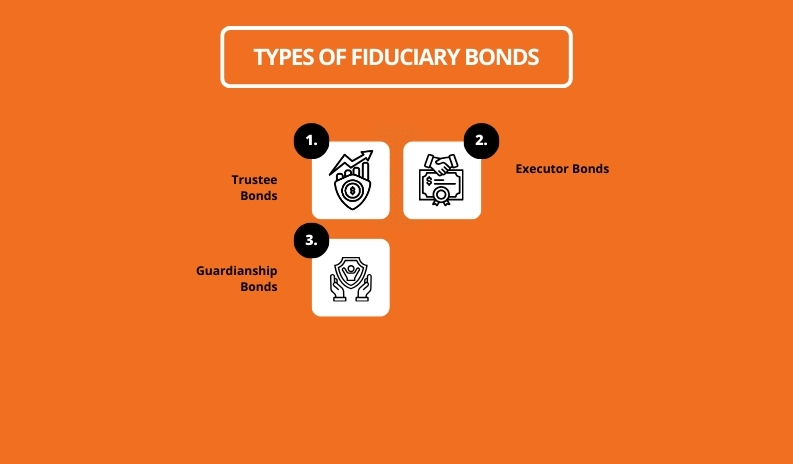Bond, Fiduciary Bond | 5 Steps to Obtain One!
by Ankita Tripathy Finance 06 November 2024

If you are trying to find out what is a fiduciary bond, this article will be super helpful for you! A fiduciary surety bond is a financial safeguard that ensures the appointment of individuals to fiduciary roles.
Fiduciary bond plays a crucial role in the financial and legal landscape. Especially when it comes to ensuring that individuals appointed to manage the interests or assets of others act responsibly. Whether in the context of estates, wills, or guardianship.
Fiduciary bonds are a protective measure that safeguards the beneficiary from potential mismanagement or fraud. The following article will explore fiduciary bonds, covering their purpose, cost, requirements, and who needs them.
What is a Fiduciary Bond? Who Needs it, How to Get it + More!

A fiduciary bond is a type of surety bond that ensures that an individual appointed to manage the assets or funds will perform their duties ethically.
The responsibilities must be carried out in accordance with the law. The individual known as the fiduciary is appointed by a court or through a will to handle someone else’s financial matters.
This includes the role of an executive of a will, trustee, or guardian for a minor or incapacitated person. If a fiduciary fails to fulfill their responsibilities appropriately, the bond can provide a remedy by compensating those harmed due to negligence.
The bond also holds those accountable for any fraud or mismanagement. The fiduciary bond meaning extends beyond simple protection. It is an assurance that the fiduciary will act in the best interest of those they are appointed to serve.
Essentially, it is a safeguard providing both peace of mind and financial records if the fiduciary fails to meet their responsibilities.
What is the Purpose of a Fiduciary Bond

The primary purpose of the fiduciary bond is to protect beneficiaries or interested parties from potential financial losses. It provides protection against misconduct or mishandling of funds by the fiduciary.
The bond is a deterrent against misuse and fraud – fiduciaries are aware that any dishonesty or negligence can lead to claims against them.
In scenarios involving guardianship, estates, or trusts, there is a significant level of confidence in the fiduciary. For instance, the fiduciary bond in a will often necessitates to ensure that the executor often estate distributes the assets fairly.
They are also required to distribute it as per the descendant’s wishes. Holding a fiduciary bond demonstrates a commitment to accountability, as the bond may be forfeited in cases of negligence or misconduct.
Thus, the bond is a preventive measure and a safety net for beneficiaries.
When is a Fiduciary Bond Required?
The fiduciary bond is often necessary when someone needs to manage someone else’s property or finances responsibly. If that doesn’t make it clear, check out the following points to know what is a fiduciary bond requirement:
- In case the court orders it. Courts often require fiduciary bonds in cases where a fiduciary must manage the assets of a minor or an incapacitated adult. This requirement by the law helps ensure a layer of financial security for those under fiduciary care.
- Trust or will specify. In some cases, the deceased individuals may require a fiduciary bond. It is necessary for the executor to carry out their duties as per the trust or will. In those cases, the executive must secure the bond before they can begin administering the estate.
- Someone is appointed as a guardian. A fiduciary bond may be necessary in certain guardianship cases, whether for a minor or an adult who cannot make decisions independently. This is common in guardianships involving substantial acids or vulnerable individuals.
As understood in each case, the fiduciary bond requirement provides security to those who cannot protect their interests. The appointed fiduciary is responsible for acting in good faith through these bonds.
Types of Fiduciary Bonds

Now that you know what is a fiduciary bond, let’s find out the types. Fiduciary bonds vary depending on the type of role the fiduciary plays. The most common types of fiduciary bonds are:
- Trustee bonds: These fiduciary bonds apply to trustees who manage your trust and are responsible for making decisions in the best interest of the beneficiaries. Trusty bonds help protect beneficiaries if the trustee acts against the terms of the trust or engages in misconduct.
- Executor bonds require an executive appointed to administer a will and handle the distribution of assets. In such cases, the fiduciary bond is in a will, and it ensures that the executor will not take undue advantage and mismanage or improperly distribute the assets.
- Guardianship bonds: These are typically necessary when an individual is appointed as a guardian for a minor or an adult unable to independently manage their affairs. This bond helps ensure that the guardian will act in the beneficiary’s best interest or protect the assets.
These common types of fiduciary bonds come with a unique responsibility that serves the same purpose. That is, providing a level of security and ensuring ethical management.
Who Needs a Fiduciary Bond?
The follow-up question to what is a fiduciary bond is usually who needs it – let’s explore. Fiduciary bonds are generally necessary for individuals who manage the affairs of others.
Also, in cases where legal and financial capacities require management. Here are some instances where A fiduciary bond may be necessary:
- Executors or administrators of estates: These individuals often post a fiduciary bond when they are responsible for settling a person’s assets, such as estates. This is also applicable in cases when there is a significant amount of assets.
- Trustees managing a trust: In cases when a trustee requires someone to oversee assets, they may need a fiduciary bond.
Each of these rules has a bond requirement that the court typically determines. Sometimes even the terms within a trust or a will can determine it. The fiduciary must follow those terms for the benefit of the beneficiaries.
How Much Does a Fiduciary Bond Cost
now that we know all about fiduciary bonds and their different aspects, it is essential to find out how much they cost.
The cost of a fiduciary bond can vary widely depending on several factors. Such as the total value of the assets, the fiduciary’s creditworthiness, and the state of bond issuance.
But how is it related to how much does a fiduciary bond cost? Generally, The price ranges from 0.5% to 1% of the total wanted amount. For example, if the fiduciary is required to post a bond of $100,000, it might be anywhere between $500 to $1000 annually.
Some States can impose minimum or maximum bond requirements, which impacts the total cost. It is worth noting that if the fiduciary has a high credit score and a clean record, they may secure a lower rate as well.
On the other hand, if the fiduciaries have poor credit history, they may face higher costs or additional requirements. This is due to the surety companies viewing them as higher-risk applicants.
Steps on How to Obtain a Fiduciary Bond

Securing the fiduciary bond includes a relatively straightforward process; however, it may vary depending on the provider and the state-specific laws. Let’s take a look:
- The first step is determining the bond amount. The bond amount is often set by the court or a will or trust document specifies it. This is typically a reflection of the total value of assets for which the fiduciary is responsible.
- Finding a reputable surety bond provider. Numerous insurance companies offer fiduciary bonds, or you may opt for specialized surety bond providers. It is essential to choose a reputable provider who assists with the process – such as the legal requirements.
- The next step includes completing the application, which often requires the fiduciary to provide financial details and personal information. This includes providing the fiduciary’s credit history. The surety bond providers use this information to assess the fiduciary’s risk level. Submit the completed application for review and wait for approval.
- Once the application submission is complete and you get the approval, the next step is paying the bond premium. The fiduciary pays this, often and renews it annually.
- Submitting the bond to the court is the last step of this process. After the fiduciary has secured the bond.
Those were all the steps of obtaining a fiduciary bond, with details about each step and how you can get them quickly. It is a straightforward process, as you may have seen, and it does not require any external support apart from an insurance provider.
You may opt for legal advice while obtaining a fiduciary bond or consult a financial advisor for the same.
Wrapping It Up!
Amidst trust, estates, and guardianships, fiduciary bonds serve as an essential safeguard to protect beneficiaries. Even any other partner who requires the security and protection of financial assets can take advantage of fiduciary bonds.
By providing a monetary remedy in cases of misconduct or misuse, these bonds ensure that the fiduciaries carry out their duties with integrity and in the best interest of the beneficiaries.
Whether required by the court of law or through a will or trust, a fiduciary bond helps establish accountability and bills trust in the fiduciary’s role.
Understanding the fiduciary bond requirement, its purpose, and the cost provides individuals with the proper knowledge needed to obtain one for themselves. The process and the other aspects of fiduciary bonds help you navigate the responsibilities ethically and effectively.
Have you ever seen someone carry out their fiduciary responsibilities? Let us know in the comments below.
Read More:



































































































